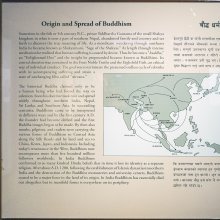Nasa, Nāsa, Nāsā, Nasha, Nasā: 34 definitions
Introduction:
Nasa means something in Buddhism, Pali, Hinduism, Sanskrit, Jainism, Prakrit, Marathi, Hindi, biology. If you want to know the exact meaning, history, etymology or English translation of this term then check out the descriptions on this page. Add your comment or reference to a book if you want to contribute to this summary article.
Nasa has 33 English definitions available.
Images (photo gallery)
Languages of India and abroad
Sanskrit dictionary
[Deutsch Wörterbuch]
Source: Cologne Digital Sanskrit Dictionaries: Böhtlingk and Roth Grosses Petersburger WörterbuchNaśa (नश):—(von 3. naś) m. nom. act.; s. dūṇaśa, durṇaśa. naśa [Vopadeva’s Grammatik 26, 33, v. l.] ist auf 1. naś zurückzuführen. — Vgl. nāśa .
--- OR ---
Nasa (नस):—
1) Nase am Ende eines adj. comp., das oxytonirt wird, [Pāṇini’s acht Bücher 5, 4, 118. 19.] Vgl. unnasa (welches mit einer hohen Nase versehen bedeutet; vgl. [Mārkāṇḍeyapurāṇa 7, 51.] [Bhāgavatapurāṇa 8, 8, 42.] [Bhaṭṭikavya 4, 18]), urūṇasa, kumbhīnasa, kharaṇasa und khuraṇasa (u. kharaṇas und khuraṇas), gonasa, druṇasa, praṇasa, vāddhrīṇasa, sunasa . —
2) f. nasā Nase [Trikāṇḍaśeṣa 2, 6, 28.] [Hemacandra’s Abhidhānacintāmaṇi 120.] — Vgl. nas, nās, nāsā, nāsikā .
--- OR ---
Nāśa (नाश):—1. (von 1. naś) m. das Verlorengehen, Verschwinden, Zunichtewerden, Zugrundegehen, Untergang, Vernichtung, Verderben; = adarśana, anupalambha, abhāva, palāyana, niṣṭhā, paridhvasti, mṛtyu [Amarakoṣa 2, 8, 2, 85. 3, 4, 10, 43.] [Trikāṇḍaśeṣa 3, 2, 428.] [Hemacandra’s Abhidhānacintāmaṇi 324. 1517.] [Hemacandra’s Anekārthasaṃgraha 2, 549.] [Medinīkoṣa śeṣa (s. II.). 8.] sarvanāśe haviṣāṃ doṣe vā [Kātyāyana’s Śrautasūtrāṇi 25, 4, 13.] avatta [1, 6, 1.] doṣa [8, 11.] liṅga [ŚVETĀŚV. Upakośā 1, 13.] kṛtakarma [6, 4.] vittasya [Bhartṛhari 2, 35.] [Hitopadeśa I, 177.] [Spr. 213.] [Manu’s Gesetzbuch 12, 79.] mārga das Verschwinden des Weges [Rāmāyaṇa 2, 47, 13. 14.] uḍu [Varāhamihira’s Bṛhajjātaka S. 45, 21.] bhāvyasya nāśaḥ kutaḥ so v. a. wie sollte das, was geschehen soll, nicht geschehen? [Bhartṛhari 2, 91.] abhikrama [Bhagavadgītā 2, 40.] buddhi 93. saṃjñā [Suśruta 1, 102, 2.] nāśaḥ kāraṇalayaḥ [Kapila 1, 122.] duṣkṛtāni sarvāṇi kṣipraṃ prayānti nāśam [Varāhamihira’s Bṛhajjātaka S. 2, 22.] āpannāśāya vibudhaiḥ kartavyāḥ suhṛdo malāḥ damit Missgeschick fern bleibe [Pañcatantra II, 182.] vṛṣṭi [Varāhamihira’s Bṛhajjātaka S. 46, 12 (13).] roga [104, 7.] nāśaṃ vrajati dīpaḥ verlöscht [79, 1.] śarīreṇa samaṃ nāśaṃ sarvamanyaddhi gacchati [Manu’s Gesetzbuch 8, 17.] [Chāndogyopaniṣad 8, 9, 1.] (nṛpaḥ) nāśameti sabāndhavaḥ [Yājñavalkya’s Gesetzbuch 1, 339.] dānavā nāśamāgatāḥ [Arjunasamāgama 10, 54.] [Rāmāyaṇa 1, 65, 15.] [Raghuvaṃśa 8, 87. 12, 67.] [Hitopadeśa I, 24. 107.] deśasya [Varāhamihira’s Bṛhajjātaka S. 30, 1. 42 (43), 22. 3, 31.] pūrvanāśe beim Tode des Früheren [Yājñavalkya’s Gesetzbuch 1, 63.] Am Ende eines adj. comp.: duḥsvapnanāśa böse Träume verscheuchend [Harivaṃśa 8459]; vgl. karmanāśā und grahanāśa . — Vgl. citta, 2. dūṇāśa. bhasmanāśa [Vetālapañcaviṃśati] in [Lassen’s Anthologie 19, 3] gewiss fehlerhafte Lesart.
--- OR ---
Nāśa (नाश):—2. (von 2. naś) m. Erreichung; s. 1. dūṇāśa .
--- OR ---
Nāsā (नासा):—f.
1) du. Nase: yo nāse pari.arpati [Atharvavedasaṃhitā 5, 23, 3.] [Bhāgavatapurāṇa 2, 1, 29. 6, 2. 3, 6, 14. 26, 54. 4, 29, 11.] sg. [Amarakoṣa 2, 6, 2, 40.] [Hemacandra’s Abhidhānacintāmaṇi 580.] [Anekārthasaṃgraha 2, 584.] [Medinīkoṣa S. 4.] [Manu’s Gesetzbuch 8, 125.] [Yājñavalkya’s Gesetzbuch 3, 89.] [Suśruta 2, 369, 10.] [Kathāsaritsāgara 15, 51.] [Gītagovinda 10, 14.] — pramāṇa [Suśruta 1, 60, 11.] roga [361, 7.] nāsārbuda [25, 6.] nāsānāṃ (beim Zugvieh) vedhakāśca ye [Mahābhārata 13, 1651.] nāsābhyantara [Bhagavadgītā 5, 27.] sunāsākṣibhruvāṇi [Nalopākhyāna 5, 6.] [Mahābhārata 7, 1570.] [Varāhamihira’s Bṛhajjātaka S. 49, 12. 50, 8] (die Hdschrr. fälschlich nāsasphig). [58, 5. 10. 46. 68, 7.] tasyāściccheda karṇanāsāṃ (!) nigṛhya tām [Rāmāyaṇa 3, 34, 22.] Am Ende eines adj. comp. [Varāhamihira’s Bṛhajjātaka S. 61, 1. 60. fgg. 69, 16.] [BṚH. 17, 12.] vakranāsa (Eule) [Pañcatantra III, 75.] ekanāsa einnüstrig [Vyutpatti oder Mahāvyutpatti 206.] f. ā [Mahābhārata 3, 13421.] [Rāmāyaṇa 3, 34, 23. 5, 17, 32.] [Bhāgavatapurāṇa 3, 20, 30. 4, 25, 22.] Vgl. kākanāsa, nāsā, gajanāsā, dhvāṅgha, nāga, nas nās, nāsikā . —
2) ein nasenartig hervorstehendes Holz über einer Thür [Amarakoṣa 2, 2, 13.] [Hemacandra’s Abhidhānacintāmaṇi 1008.] [Hemacandra’s Anekārthasaṃgraha] [Medinīkoṣa] Vgl. nakra 4. —
3) Gendarussa vulgaris Nees. (vāsaka) [Rājanirghaṇṭa im Śabdakalpadruma]
--- OR ---
Nāsā (नासा):—vgl. śuka .
Source: Cologne Digital Sanskrit Dictionaries: Sanskrit-Wörterbuch in kürzerer FassungNaśa (नश):—m. Nom. act. in duṇaśa und dūṇaśa.
--- OR ---
Nasa (नस):—am Ende eines adj. Comp. und *f. ā Nase.
--- OR ---
Nāśa (नाश):—1. m. (adj. Comp. f. ā) das Verlorengehen , Verlust , das Verschwinden , Zunichtewerden , Zugrundegehen , Untergang , Vernichtung , Verderben. duḥsvapna Adj. böse Träume verscheuchend.
--- OR ---
Nāśa (नाश):—2. m. Erreichung in 1. dūṇāśa.
--- OR ---
Nāsā (नासा):—f. —
1) Du. und Sg. ([128,28]) Nase. Am Ende eines adj. Comp. f. ā. —
2) *ein nasenartig hervorstehendes Holz über einer Thür. —
3) *Gendarussa vulgaris [Rājan 4,48.]
Sanskrit, also spelled संस्कृतम् (saṃskṛtam), is an ancient language of India commonly seen as the grandmother of the Indo-European language family (even English!). Closely allied with Prakrit and Pali, Sanskrit is more exhaustive in both grammar and terms and has the most extensive collection of literature in the world, greatly surpassing its sister-languages Greek and Latin.
See also (Relevant definitions)
Starts with (+153): Nacai, Nacaikunar, Nacainar, Nacaivinai, Nacaivu, Nacaiyunar, Nacaiyurai, Nacakalam, Nacakari, Nacakkiram, Nacal, Nacalali, Nacam-arrupovan, Nacamaruvan, Nacamocam, Nacan, Nacanaca, Nacanai, Nacanam, Nacanan.
Ends with (+453): Abanasa, Abhikramanasha, Abhikshnasha, Adavi panasa, Adhimanasa, Aghanasha, Agnibalanasha, Agninasha, Agyaghanasa, Aharanasha, Ainasa, Ajakshiranasha, Ajirnamsha, Akrishtamanasa, Alambanasha, Alimanasa, Amapinasa, Amgamshavinasha, Amitamanasa, Amlapanasa.
Full-text (+386): Shukanasa, Gonasa, Nasadaru, Vinasha, Kakanasa, Nasaputa, Ceshtanasha, Nas, Nasavamsha, Nasachinni, Linganasha, Sunasa, Nasika, Nasya, Apinasa, Kumbhinasa, Tiryannasa, Apanasa, Nasarandhra, Pinasa.
Relevant text
Search found 68 books and stories containing Nasa, Nāsa, Nāsā, Nasha, Nasā, Naśā, Nāśa, Nāśā, Naśa, Ṇasa, Ṇāsa, Ṇāsā; (plurals include: Nasas, Nāsas, Nāsās, Nashas, Nasās, Naśās, Nāśas, Nāśās, Naśas, Ṇasas, Ṇāsas, Ṇāsās). You can also click to the full overview containing English textual excerpts. Below are direct links for the most relevant articles:
Garga Samhita (English) (by Danavir Goswami)
Verse 5.24.37 < [Chapter 24 - The Killing of the Kola Demon]
Verse 2.14.28 < [Chapter 14 - Description of Kāliya’s Story]
Verse 4.19.29 < [Chapter 19 - A Thousand Names of Srī Yamunā]
The Practice Manual of Noble Tārā Kurukullā (by Dharmachakra Translation Committee)
The Tattvasangraha [with commentary] (by Ganganatha Jha)
Verse 363-364 < [Chapter 8 - Examination of the Doctrine of the Permanence of Things]
Verse 1127-1130 < [Chapter 16 - Examination of the Import of Words]
Verse 373-374 < [Chapter 8 - Examination of the Doctrine of the Permanence of Things]
Rig Veda (translation and commentary) (by H. H. Wilson)
Chaitanya Bhagavata (by Bhumipati Dāsa)
Verse 2.28.46 < [Chapter 28 - The Lord’s Pastime of Accepting Sannyāsa]
Verse 3.1.150 < [Chapter 1 - Meeting Again at the House of Śrī Advaita Ācārya]
Verse 3.10.133 < [Chapter 10 - The Glories of Śrī Puṇḍarīka Vidyānidhi]
Sushruta Samhita, Volume 6: Uttara-tantra (by Kaviraj Kunja Lal Bhishagratna)
Chapter VII - Pathology of the diseases of the Pupil < [Canto I - Shalakya-tantra (ears, eyes, nose, mouth and throat)]
Chapter XXII - Causes and symptoms of diseases of the nose < [Canto I - Shalakya-tantra (ears, eyes, nose, mouth and throat)]
Chapter XXIII - Therapeutics of nasal diseases < [Canto I - Shalakya-tantra (ears, eyes, nose, mouth and throat)]
Related products



